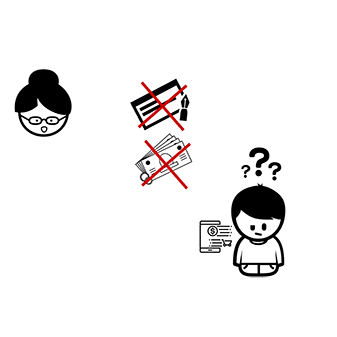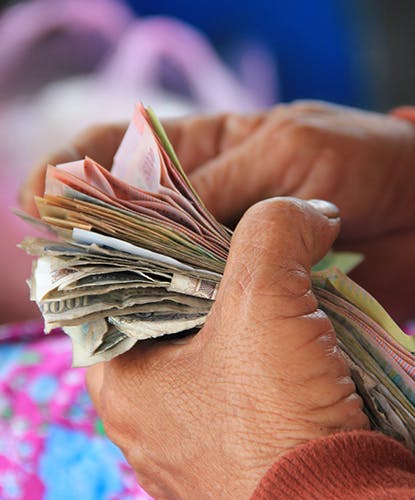Insight #1
To offer money, not all currencies are equal
When they offer money to each other (at Christmas, birthdays ...), individuals reconstitute the social and emotional ties that unite them. Coins, notes, checks, offered in decorated envelopes and accompanied by messages materialize this gift and these links. With the emergence of virtual currencies, the money remains but the gift gesture disappears as well as the person who does it.

1. To bind to others, individuals use material currencies
Within the family, the renewal of alliances between generations often involves the handing over of checks - folded or in envelopes - or cash in the palm of the hand. A moment of intimacy is often waited to make this gesture. Because handing money face-to-face literally makes individuals become closer to each other. And the precautions taken to hide the differences in wealth creates an impression of goodwill. Thanks to money, socially different people can still bond: that's what really matters!

2. But the dematerialization of money disrupts this social activity
To accelerate the flow of money, banking sector tends to put checks and cash aside. Ideal to create a sense of kindness, the small ceremony surrounding the handing over of money is no longer necessary: in the future, the money could no longer be passed from hand to hand, but directly be transferred from one account to another. In short, the return on investment becomes uncertain: how can money generate proximity if it is offered remotely and without any precaution?

3. However, some dematerialized currencies make it possible to create social links
By keeping a physical incarnation of its currency - an iTunes gift card - Apple helps its customers: they can still mobilize money to create social relationships. The precautions that generate goodwill senses still be taken because the money is hidden and can be given in person. But money from an iTunes card or a gift card is not accepted everywhere; this is why individuals prefer cash when it comes to offering money.

4. Material and dematerialized money
Individuals use currencies that allow them to bond with each other, when the currencies put forth by the banks have the effect of separating them. And if dematerialized currencies also made it possible to create social relations without restricting the use of money?
L'étude

#GérerSonArgent
Currencies in practice
The banking sector believes that individuals use different currencies interchangeably and that they use them only to pay for purchases. In reality, individuals do not use all currencies in the same way, even though these currencies have exactly the same financial value. These various practices deserve to be understood to be better accompanied.
Découvrir l'étude


